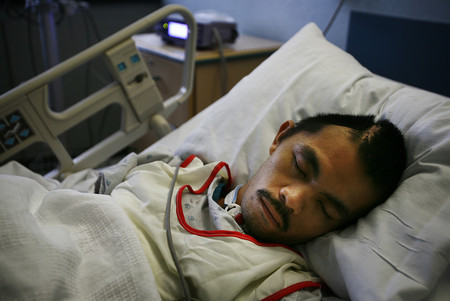Boxer’s treatment costs spur look at injury fund
The creation of a fund earmarked for catastrophic injuries to boxers and martial arts fighters is being studied by the Nevada Athletic Commission, its chairwoman said Tuesday.
That action, according to Pat Lundvall, the commission chairwoman, is the result of a Sunday Review-Journal story that detailed how taxpayers are on the hook so far for about $450,000 in medical bills for boxer Z "The Dream" Gorres.
Gorres, who is from the Philippines, suffered a severe brain injury in a Nov. 13 fight with Luis Melendez at Mandalay Bay. He was covered for $50,000 in medical expenses, the amount the state requires promoters to provide for fighters.
After nearly two months of constant nursing care and physical therapy and after cutting-edge neurosurgery at the publicly funded University Medical Center, the tab for Gorres' medical care is nearly $500,000.
Trauma surgeon Dr. Michael Casey said the boxer, who arrived at UMC "nonfunctional and vegetative," is on his way to becoming a "functional human being who will be able to care for his wife and four children."
Gorres is awaiting a procedure to reattach a piece of his skull, but that will cost another $45,000, UMC physician Dr. Richard Ongtengco said.
"I'm hesitant to send him back to the Philippines for the procedure because I'm not sure he can get it done right there," he said.
Lundvall said to prevent taxpayers from paying the medical bills of fighters in the future, she is asking some of the "best minds in insurance" to devise ideas "along the lines of an annuity."
An annuity is a financial product designed to accept and grow funds. It can be structured many ways, but it's mainly known for securing a steady cash flow for an individual during retirement.
Lundvall, a Reno attorney, said she envisions a monetary pool for catastrophic injuries being funded through a small percentage of both ticket sales and pay-per-view sales in Nevada.
How much that percentage would be, she said, "needs much more study." She said the question of how to fund a catastrophic medical pool will be on the commission's agenda in February.
"We want to deal with this as quickly as we can," she said.
Assembly members Tick Segerblom and Mark Manendo, both D-Las Vegas, say they will work on bills in 2011 to ensure taxpayers do not have to pick up costs for fighters hurt in matches sanctioned by the state.
Between 1995 and 2005, 10 boxers suffered brain injuries in Las Vegas. Two of those boxers died. Because of federal privacy laws, UMC cannot divulge how much care the hospital provided for which it was not reimbursed.
Gorres' wife waived the privacy laws in discussing her husband's case with the Review-Journal. She prays that people will contribute to funds that will help her family.
Manendo said it is past time to change an outdated law that doesn't require adequate medical care for hurt boxers.
"Right now, of all times, we have to be as fiscally conservative as we possibly can," Manendo said.
Assemblyman Joe Hardy, R-Boulder City, thinks "some kind of bond system" might solve the problem.
Clark County Commissioners Lawrence Weekly, Chris Giunchigliani, and Steve Sisolak have contacted legislators about bills or the athletic commission about finding ways to make changes.
Sisolak said he has asked UMC CEO Kathy Silver to document whether the hospital and taxpayers have to pick up medical costs incurred in other sporting events.
"I want to know, for example, if (motorcycle daredevil) Evel Knievel picked up his medical expenses when he got hurt here," Sisolak said. "These aren't things that UMC and taxpayers should be liable for."
In a Monday letter to athletic commission Executive Director Keith Kizer, Sisolak said "it seems there should be a higher cap on the medical coverage provided by the promoters of these events."
Kizer said he does not think UMC has had to pay many medical bills for hurt boxers in the past. But he is uncertain. "What I know is anecdotal," he said.
Lundvall cautions against forcing promoters to pay too much in premiums. She said big-time promoters can afford tens of thousands of dollars in premiums, but small promoters cannot.
According to rates on the Texas-based Laurence Cole Insurance Agency's Web site, www.boxinginsurance.com, a premium for $50,000 of medical coverage on a boxer for a fight costs about $2,000.
"Small fights and amateur fights also have to have the same coverage," she said.
She said Nevada benefits greatly from boxing, and the state doesn't want to appear inhospitable to the sport.
A recent study done by the Las Vegas Convention and Visitors Authority on the nongaming economic effect of 20 major fights since 2005 found that nearly $200 million was poured into the community by visitors.
Federal boxing laws passed in both 1996 and 2000 mandate medical insurance for fighters but don't stipulate how much is required. A bill passed in 2000 in honor of Muhammad Ali urges that states follow guidelines recommended by the Association of Boxing Commissions in regard to medical insurance. But the association's president, Tim Lueckenhoff, said not all states follow the recommendations.
The association, he said, recommends a minimum of $10,000 medical coverage, which he said is "about the average" in states. He said the federal law provides no way to mandate coverage recommended by his organization.
"Commissions are all over the board on the maximum amount of insurance required for boxing and MMA (mixed martial arts) events," he said, adding that "it's obvious" there isn't enough medical insurance on boxers.
Lueckenhoff said he thinks boxers personally should carry some insurance.
"I realize many of them are poor, but since they are professionals and this is their job, so to speak, boxers should carry other types of medical insurance as you and I do," he said.
Lueckenhoff said some states require promoters to put up only $2,500 in medical insurance for each fighter.
"Nevada has the highest requirement for medical insurance," he said.
Lueckenhoff said since the Review-Journal's Sunday story, the issue is being discussed in boxing circles.
"It isn't something we've really thought about in the country before.
"I am certain that any state that has had a major injury in boxing has had to deal with this same situation, but I do not have any documentation of that," Lueckenhoff said.
Contact reporter Paul Harasim at pharasim@reviewjournal.com or 702-387-2908.
Watch the video























